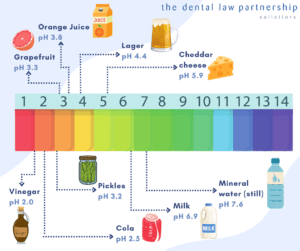What you eat and drink can have an impact on your dental health. Almost 1 in 3 adults have tooth decay due to their diet, this has led to around 74% of adults needing a tooth extraction.
Tooth decay occurs when foods containing sugar react with the bacteria in plaque on your teeth, subsequently, the acid can then further attack your teeth destroying the enamel. This can lead to a cavity or hole forming in the tooth.
So how can you tell how much sugar is in food?
You can start by looking at the nutritional factors on the back of a packet. You may see sucrose, fructose, and glucose. These are all different types of sugar that could damage your teeth. Be careful with food that has ‘no added sugar’, this doesn’t necessarily mean there is no sugar, it means no extra sugar has been added. Some sugars can be listed as carbohydrates or the words that end in ‘ose’. Acidic foods can also cause erosion, the lower the pH number, the more acidic the product is. Anything lower than 5.5 can cause erosion.
How acidic is your food?

Do you remember to brush your teeth?
You should brush your teeth twice a day, morning and night, with fluoride toothpaste. Children up to 3 need 1000ppm (parts per million), and 3+ need between 1350ppm to 1500ppm of fluoride in their toothpaste. Brushing at night is crucial to your dental health as the flow of salvia slows down and leaves the mouth dry which may result in a high risk of tooth decay. It’s also advisable to either brush your teeth or chew gum after snacks in order to increase saliva flow to the mouth. [1]

